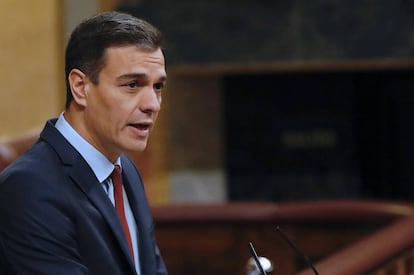Spanish PM announces decree to deal with a “disorderly” Brexit
Pedro Sánchez told Congress the measure would seek to protect the rights of Britons in Spain and Spaniards in Britain after the UK leaves the European Union

Spanish Prime Minister Pedro Sánchez on Wednesday announced that his Cabinet is going to approve a decree covering the eventualities of a “disorderly” Brexit – i.e. should the United Kingdom crash out of the European Union on March 29 without a deal.
Sánchez made the commitment during the last plenary session of Congress before the political term ends and a general election is held on April 28. The Socialist Party (PSOE) prime minister, who is governing in a minority, called the snap election after his 2019 budget plan was rejected by Congress.
The goal of the plans is to preserve the rights of Spanish and British citizens
Spanish PM Pedro Sánchez
“Safeguarding the rights of Spaniards in the UK is fundamental for the government of Spain,” he said with reference to the Spanish government’s preparation for Brexit. “There are also plans for administrative and legal cooperation on criminal matters.”
The measures contained in the decree, which is due to be approved by the Cabinet on Friday, will be “temporary and unilateral” in anticipation of UK reciprocity.
“The goal of the plans is to preserve the rights of Spanish and British citizens, as well as preserving a normal trade flow and safeguarding Spanish economic interests,” said the PM. “My main goal was to guarantee that the UK’s decision [to leave the EU] would have the smallest possible impact on citizens and businesses.”
Ticking clock
Time is running out for the UK to reach a deal with the EU before it is due to leave the 28-country bloc, with the scheduled March 29 departure date coming two years after the British government triggered Article 50, the mechanism by which a country begins the process to depart from the union. Prime Minister Theresa May has drawn up a Withdrawal Agreement with Brussels, but it has so far been rejected by British members of parliament. This means that as things stand, the UK could either leave without a deal, immediately turning it into a third country with relation to the EU, or could seek to extend the March 29 deadline.
Gibraltar
Speaking in Congress on Wednesday, Sánchez also mentioned Gibraltar, the British Overseas Territory located in the south of Spain that remains a source of friction between Madrid and London.
“Given the uncertainties of the Withdrawal Agreement, there is one aspect that seems especially relevant to me: everything we agreed to with Gibraltar will remain in force, even if there is no Withdrawal Agreement,” he said.
A delayed Brexit
Spain will not oppose a delay to the UK’s exit from the EU, a possibility that has been suggested by British PM Theresa May in order to prevent Britain from crashing out of the union. Pedro Sánchez said on Wednesday in Congress that his government would not oppose such an extension, but noted that there should be some perspective for when it would happen. “Prolonging the uncertainty by delaying deadlines is not a reasonable, nor a desirable, alternative,” he said.
Under the terms of Brexit, Gibraltar will also be leaving the EU, despite the fact that Gibraltarians overwhelmingly supported the “remain” option in the 2016 referendum. This gives Spain an edge to make demands, and so far it has managed to include a specific protocol on Gibraltar in the UK Withdrawal Agreement. Spain has also secured a veto right over the application in Gibraltar of any future deal between Brussels and London.
Four bilateral memorandums of understanding have also been signed on the thorniest issues regarding the British Overseas Territory, including the environment, taxes, cross-border workers and land reclamation.
“We had two clear goals: maintaining the mobility of workers and initiating a process to rationalize issues such as environmental and police cooperation, and the price of tobacco,” said Sánchez. “The deal reached [on Gibraltar] is the best one possible.”
English version by Susana Urra.
Tu suscripción se está usando en otro dispositivo
¿Quieres añadir otro usuario a tu suscripción?
Si continúas leyendo en este dispositivo, no se podrá leer en el otro.
FlechaTu suscripción se está usando en otro dispositivo y solo puedes acceder a EL PAÍS desde un dispositivo a la vez.
Si quieres compartir tu cuenta, cambia tu suscripción a la modalidad Premium, así podrás añadir otro usuario. Cada uno accederá con su propia cuenta de email, lo que os permitirá personalizar vuestra experiencia en EL PAÍS.
¿Tienes una suscripción de empresa? Accede aquí para contratar más cuentas.
En el caso de no saber quién está usando tu cuenta, te recomendamos cambiar tu contraseña aquí.
Si decides continuar compartiendo tu cuenta, este mensaje se mostrará en tu dispositivo y en el de la otra persona que está usando tu cuenta de forma indefinida, afectando a tu experiencia de lectura. Puedes consultar aquí los términos y condiciones de la suscripción digital.








































